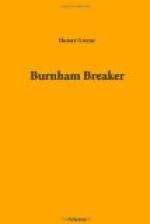“In that case,” said the judge, “I presume you will have nothing further to offer on the part of the plaintiff, Mr. Sharpman?”
“Nothing,” replied that gentleman, with an involuntary, smile of satisfaction on his lips.
“Then,” said Goodlaw, who was still standing, “I suppose the evidence may be declared closed. I know of no—” He stopped and turned to see what the noise and confusion back by the entrance was about. The eyes of every one else in the room were turned in that direction also. A tipstaff was trying to detain Ralph at the door; he had not recognized him. But the boy broke away from him and hurried down the central aisle to the railing of the bar. In the struggle with the officer he had lost his hat, and his hair was tumbled over his forehead. His face was grimy and streaked with perspiration; his clothes were torn and dusty, and in his hand he still carried his shoes and stockings.
“Mr. Goodlaw!” he exclaimed in a loud whisper as he hastened across the bar, “Mr. Goodlaw, wait a minute! I ain’t Robert Burnham’s son! I didn’t know it till yestaday; but I ain’t—I ain’t his son!”
The boy dropped, panting, into a chair. Goodlaw looked down on him in astonishment. Old Simon clutched his cane and leaned forward with his eyes flashing fire. Mrs. Burnham, her face pale with surprise and compassion, began to smooth back the hair from the lad’s wet forehead. The people back in the court-room had risen to their feet, to look down into the bar, and the constables were trying to restore order.
It all took place in a minute.
Then Ralph began to talk again:—
“Rhymin’ Joe said so; he said I was Simon Craft’s grandson; he told—”
Sharpman interrupted him. “Come with me, Ralph,” he said, “I want to speak with you a minute.” He reached out his hand, as if to lead him away; but Goodlaw stepped between them, saying, sternly:—
“He shall not go! The boy shall tell his story unhampered; you shall not crowd it back down his throat in private!”
“I say the boy shall go,” replied Sharpman, angrily. “He is my client, and I have a right to consult with him.”
This was true. For a moment Goodlaw was at his wit’s end. Then, a bright idea came to him.
“Ralph,” he said, “take the witness-stand.”
Sharpman saw that he was foiled.
He turned to the court, white with passion.
“I protest,” he exclaimed, “against this proceeding! It is contrary to both law and courtesy. I demand the privilege of consulting with my client!”
“Counsel has a right to call the boy as a witness,” said the judge, dispassionately, “and to put him on the stand at once. Let him be sworn.”
Ralph pushed his way up to the witness-stand, and the officer administered the oath. He was a sorry-looking witness indeed.
At any other time or in any other place, his appearance would have been ludicrous. But now no one laughed. The people in the court-room began to whisper, “Hush!” fearing lest the noise of moving bodies might cause them to lose the boy’s words.




